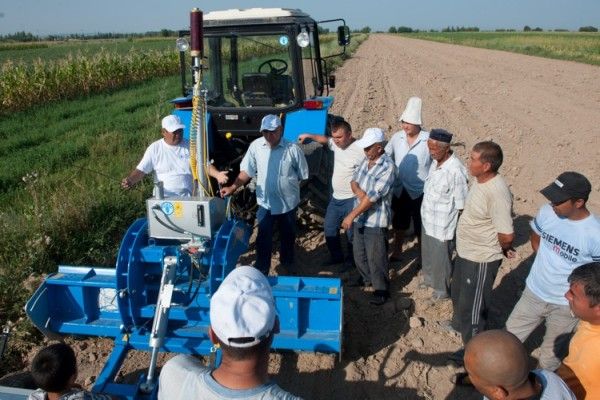BISHKEK (TCA) — Turkish importers will buy beans grown in Kyrgyzstan’s Talas province for 33-35 soms per kilogram ($1=76 soms), the Kyrgyz Agriculture Ministry said. Currently, the price is 20-28 soms.
Talas farmers held several rallies to protest low bean prices in 2015.
Last November, PM Temir Sariyev urged local people to eat more beans to support domestic farmers, saying that beans are inexpensive and good for health.
The United Nations launched the 2016 International Year of Pulses to raise awareness about the protein power and health benefits of all kinds of dried beans and peas and boost their production and trade.
“The International Year 2016 is a great opportunity to raise awareness of the benefits of pulses as the world embarks on efforts to achieve the newly adopted Sustainable Development Goals,” said UN Secretary-General Ban Ki-moon in a message on the occasion. Pulses contribute significantly in addressing hunger, food security, malnutrition, environmental challenges and human health and also are a vital source of plant-based proteins and amino acids, Ban Ki-moon added.
According to FAO, pulses can greatly benefit people’s health and livelihoods in developing countries, where protein sources from milk are much more expensive than protein sourced from pulses.
Sugar beet
The Ministry of Agriculture forecasts an increase in the area under sugar beet in 2016 in Kyrgyzstan.
The ministry has urged farmers of the Talas province to grow less legumes and more sugar beet and potato.
Sugar beet was planted on more than 5.3 thousand hectares in the northern Chui province last year, and the area can be increased up to 10 thousand hectares in 2016. The Government is negotiating with the Russian-Kyrgyz Development Fund on allocating loans to the Kaindy-Kant sugar plant in order it could be able to cope with the processing of sugar beet to be grown by local farmers.
According to the Kaindy-Kant plant, as soon as the governments of Kyrgyzstan and Kazakhstan agree to reduce railway tariffs for the transportation of raw sugar beet, a beet collection terminal will be opened at the Maimak border checkpoint, and the plant will be able to enter into contracts with Talas farmers on acceptance and processing of raw beet harvest of 2016.
Incorrect forecast
According to the Agriculture Ministry, it is not profitable to grow cereals in Kyrgyzstan because after the country’s entry to the Eurasian Economic Union, Kazakhstan and Russia do not pay VAT when exporting grain to Kyrgyzstan. Moreover, Kyrgyz wheat contains less gluten and cannot compete with Russian and Kazakh wheat.
Last year, Kyrgyz farmers could not sell their crops and suffered huge losses because of the ministry’s incorrect forecast. Farmers grew more potato, hoping to sell it in the EEU member countries. However, the EEU market was closed for them due to the absence of quality certificates. As a result, farmers had to sell potatoes in Kyrgyzstan at a very low price. The ministry should have foreseen those risks, Kyrgyz MPs concluded.
Concessional loans
From January 25, Kyrgyz farmers will start receiving preferential loans within the state program of concessional financing of the agricultural sector, the Government’s press service said.
This year, the Government plans to allocate at least 400 million soms to subsidize interest rates for concessional lending for agriculture. It is planned to spend about 3 billion soms at 12 percent per annum for the spring field works. This money is not enough, and the Ministry of Finance and Ministry of Agriculture, as well as the state owned Aiyl Bank and RSK Bank, have to increase the volume of concessional lending.
Last year, farmers received 3.8 billion soms of soft loans, of which 74 percent were allocated to cattle breeders. This year, farmers can apply for preferential loans for the construction of greenhouses and cattle slaughter shops.
In the villages, there are large families and people with low incomes who want to take loans to increase their livestock and crop production. The Government has to support people who want to work, Prime Minister Sariyev said. It is necessary to consider increasing the threshold of group credits issued without collateral up to 200,000 soms and credits for individuals up to 100,000 soms. In order the borrowed money is used for their intended purpose, effective mechanisms for the return of loans should be developed.
The terms of lending have been increased to 36 months, the Finance Ministry said. Commercial banks and specialized financial and credit institutions participating in the program will lend to borrowers engaged in crop production, animal husbandry and processing of agricultural products and services in the agricultural sector.
In addition, farmers can get loans for machinery leasing from the Kyrgyz-Russian Development Fund, which will operate through state-owned banks. These loans will be issued only for leasing of machinery produced in the Eurasian Economic Union member countries.



